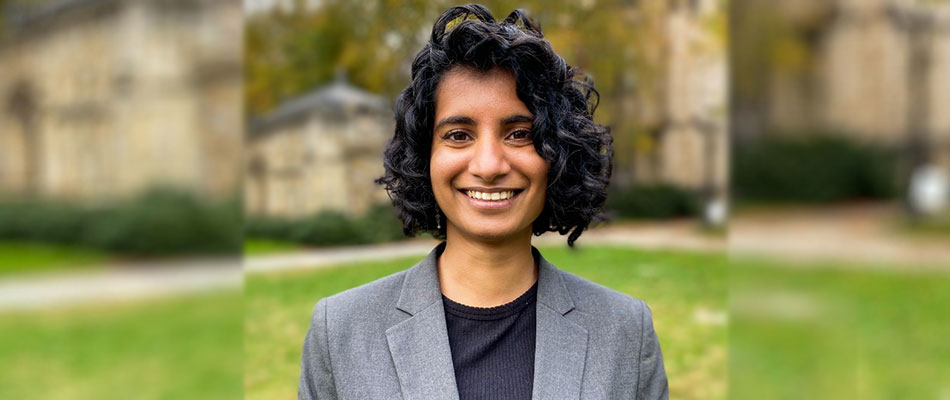From Malala Yousafzai and Greta Thunberg to students in India, young women are leading the way for change. They are championing causes that are not only close to their hearts.
From Malala Yousafzai and Greta Thunberg to students in India, young women are leading the way for change. They are championing causes that are not only close to their hearts but also have tremendous value at a global level. Shimul Bijoor presents such a story. It was during her internship with Waste Warriors Society, Dharamsala that Shimul Bijoor first developed the passion for environmental conservation. The FLAME University alumna built on the passion as a Carbon and Energy Modelling intern, and then by conducting field research on effective management and governance practices for marine protected areas of Andaman and Nicobar Islands. She is currently pursuing Master of Environmental Management, Conservation and Sustainable Finance at Yale School of Forestry and Environmental Studies at Yale University, USA. As a Student Program Manager for the Conservation Finance Network, she also leads a team of student writers for reporting and analysis of conservation financing instruments, and represents student writers in the board of editors. We spoke with Shimul about taking her passion to the next level - bringing it out of the ‘echo’-chamber of only people who care, and effecting change in environmental policy and implementation globally.
Your internships, research projects, and the Master’s programme you are currently pursuing reflect your passion for environment. How did you get involved with the cause?
During my first summer at FLAME University, while working with a waste management NGO in the Himalayas, I spent several weeks sifting through mountains of collected trash, and segregating recyclables and reusables. This was a stirring experience, as I was faced with the physical evidence of the inefficiencies of our global economy. I began questioning the life cycles of products and processes, and the impact of our choices on the environment.
You completed BA in Environmental Studies and followed it up with a Project Assistant role in the Andaman and Nicobar Islands. But then you chose to pursue your Master’s programme in USA. Why?
During my work with several organizations and communities on the field, my biggest take-away was that climate solutions were being held back due to a lack of funding and support, especially towards solutions led by women and people of colour. Additionally, decision-making for the distribution of funds was concentrated in the United States and Europe, with teams that did not represent backgrounds like mine. I chose this program at Yale with the goal of facilitating the movement of capital into community and climate resilience, and to help companies and investors make representative and impactful decisions.
As a former researcher with a marine conservation non-profit organization in India, could you identify the biggest challenges in the area?
In my experience, one of the biggest threats across any ecosystem, is in understanding and influencing a system-level change. Understanding the roles of various communities and stakeholders and their interactions with the environment is what allows for the structuring of any successful conservation project. This is why a majority of my work with Dakshin involved speaking to and maintaining relationships with a number of different government departments, communities, business owners, and other organizations that were involved with the ecosystem in some way.
There is a common belief that a career in environmental management is only restricted to academia and non-profit organizations. Has that been your experience?
For-profit companies are among the biggest emitters. They not only have among the largest impacts on the environment, but also the ability to influence social and economic activity. With increasing regulatory pressure, companies are being pushed to rethink their strategies and processes. As a result, there are growing opportunities in corporate sustainability, environmental impact assessment, sustainability reporting, impact investing, etc.
At Yale, you contribute to an online publication, and you were also involved with the Environmental Film Festival at Yale, both related to the environment in important ways. What is the focus of your study, and how does it fit in with your future goals?
I specialize in Conservation and Sustainable Investing, and am exploring innovative financial mechanisms to direct more public and private funds towards social and environmental resilience. Additionally, since I minored in Design during my undergraduate program, I have always been interested in exploring different mediums of communicating environmental issues – film being one of the most engaging and powerful media. This is why I have enjoyed leading various projects that explore researching and communicating environmental issues and solutions and am fortunate to have had the chance to write for the Conservation Finance Network as well as help organize and curate the Environmental Film Festival at Yale (EFFY). I hope that my future roles also allow me to step into multiple shoes and explore various methods of engaging with sustainability.


